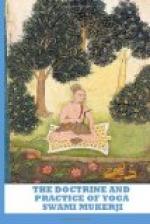when you are exercising this function. The mind
becomes exhausted after a great deal of such effort
and cries out for rest, because conscious attention
implies close concentration of thought and can be
exercised only by the conscious use of Will-Power.
You ought to be able to concentrate upon one subject
of thought, study and observation with undivided attention
and then take your mind off that subject and put it
on something else, at your will. Train your mind
to ‘give’ perfect attention to any subject
you like and also to ‘shut off’ or inhibit
all attention on that subject. The mind is a restless
thing darting from one thing to another, and, like
a spoilt child, tiring of continued attention.
But you must, by Will-Exercise, get control over this
tendency. ‘Exercise develops power.
Practice makes perfect.’ This you must
bear in mind and, by patience and perseverance, train
your mind to ‘pay attention’ where it
ought to do so and not to pay attention where it ought
not to. At first your mind will rebel like an
unbroken horse at the imposition of such restraint.
But really all greatness results from mind-control.
Remember active mentation is conscious, deliberate
concentration. Passive mentation represents automatic,
involuntary thinking. This includes the subconscious
or ‘habit’ mind. When a certain thought-groove
has been formed in your mind, energy flows into it
involuntarily, i.e., by itself and without any
conscious effort on your part. This is passive
mentation. It is automatic mental activity.
Take an example. Some school-boys find Mathematics,
Science and Geography easy to master from the very
start. They feel quite in sympathy with the teacher
of Mathematics. But History and Language are their
abomination. There are others who simply cannot
‘take an interest’ in any Mathematics
but who shine brilliantly in Language, Recitation,
Composition, History. As a matter of fact neither
of these students is superior to the other, but each
is great in his own line. In one set, you have
an example of automatic mentation in Mathematics, Science
and Geography; in the other in Literature and Art.
But suppose the first set tried to master Literature
and Art and the second grappled with Mathematics and
Science, each would then be practising actual concentration.
In each set the active function would be exercised
and will-power would develop on both sides. Do
you see? Occultists say that all power results
from the continual exercise of active mentation and
all weak-mindedness is the direct outcome of this wool-gathering,
castle-building, inattentive habit which is an extension
of passive mentation into useless channels of thought-force.
Conscious attention concentrates and even specializes
mental energy as the sun-glass concentrates and intensifies
the heat of the rays of the sun. Focus your full
attention upon the thing to be done, take a keen interest
in its accomplishment to the exclusion of all else,
and you will obtain wonderful results. The man
of developed, concentrative power holds in his hand
the key to success, with the results that all his actions,
voluntary or involuntary, are pointed to the accomplishment
of his object. Remember therefore in conclusion:




